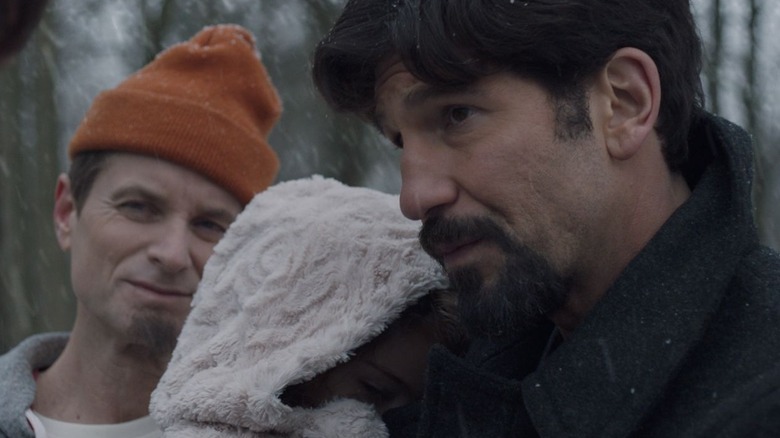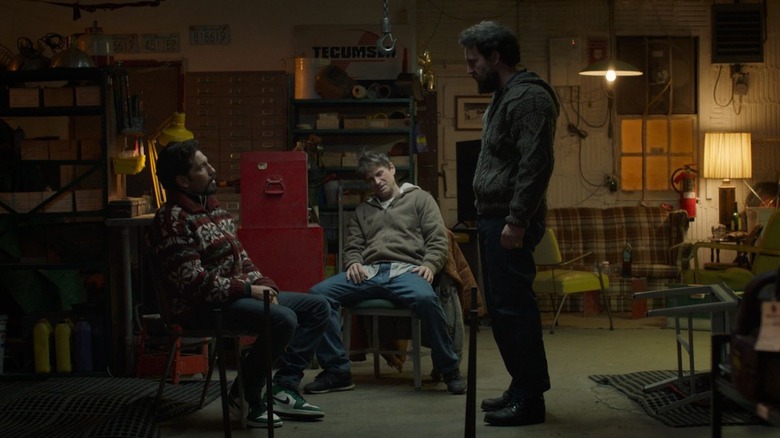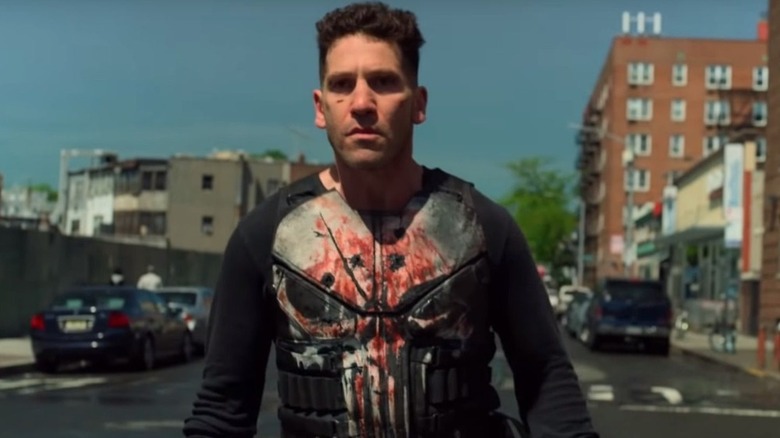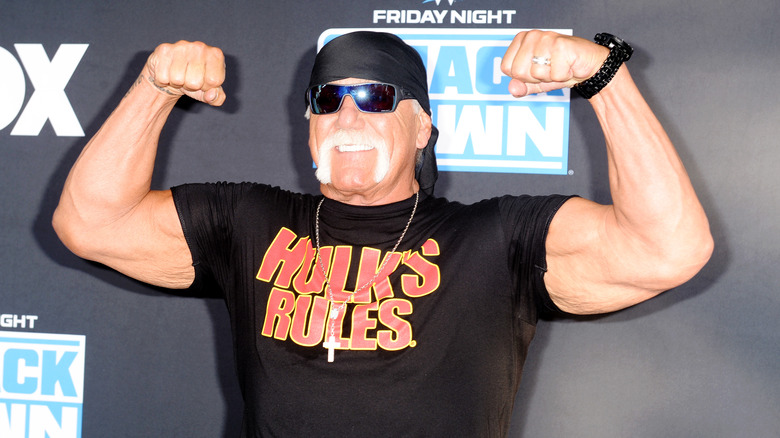Small Engine Repair's Cast Discusses The Film's Deeper Meaning - Exclusive Interview
"Small Engine Repair" is the story of three lifelong friends — played by writer/director John Pollono, Jon Bernthal ("The Walking Dead," "The Punisher"), and Shea Whigham ("Boardwalk Empire," the "Fast and Furious" franchise) — who share a love of off-color conversations and rowdy nights out. But when Frankie (Pollono) invites his buddies to a whiskey-fueled get-together at his repair shop, things quickly spin wildly out of control when a mysterious acquaintance shows up.
Based on Pollono's award-winning play, "Small Engine Repair" is a black comedy/drama that takes an unexpected twist while exploring friendship, class struggle, and toxic masculinity. The film is currently in theaters.
During an exclusive interview with Looper, Pollono, Bernthal, and Whigham sat down to discuss the provocative themes that run through the film, what the transition from theater to screen was like, and what to expect from Pollono's next movie, a Hulk Hogan biopic starring Chris Hemsworth and directed by Todd Phillips.
Small Engine Repair is a 'dangerous' and 'visceral' experience
There is a lot of decidedly un-PC language and dialogue used in "Small Engine Repair." And maybe that has socio-political connotations, but obviously the whole concept came from you, John, so could you explain what you're trying to say with this film?
John Pollono: Well, look, it originated in theater, and theater is a place to create provocative art and discussions. Theater audiences want to be provoked, and they want to experience that. So I tried to take that philosophy over into film and just be honest. I think if you're using certain language in situations cavalierly, then that could be irresponsible. But in this case, it's all in service of the theme, and it's all in service of trying to create a dialogue and to feel something, and, to me, create a dangerous, visceral artistic moment that can hopefully spark discussion. There are many ways to move the needle, and sometimes you need to do that with a utopian version of the world. And sometimes, like this, you need to get kind of messy in order to have the result you want.
Shea, John P. and Jon B. worked together on the original play ten years ago and kind of built these characters. How was it coming in as the newbie of the trio as Packie?
Shea Whigham: It was scary and exhilarating at the same time. They were working in conjunction, which I think is the best way. You're very nervous to take something like this on, but also there's a certain elation. I was so welcomed in by them. We got a chance to really sit with each other, talk with each other, drink with each other — not talk about the script for about the first two weeks, just talk about each other, because I find you can't force relationships onscreen. You can't. You let them come to you, and this was the situation to have that happen. And I think you see it onscreen.
Jon Bernthal reflects on what it's like to play hyper-masculine characters like The Punisher
Now, Jon, you were starring in this play right as "The Walking Dead" was exploding into the cultural phenomenon that it is. Can you reflect back on that time in your life and career?
Jon Bernthal: Look, an unbelievably exciting time and scary time and a beautiful time. But more importantly than I think any of that, it was right after I got married, and my wife was pregnant with our first child. And I met John. I was going through some trouble at the time and trying to get some things cleaned up. I couldn't really leave L.A., and I went to a reading of this play, and I was just blown away. I was just blown away.
You spoke a couple of minutes ago about the dialogue and sort of the flavor of the dialogue. I found it just so incredibly smart and honest and authentic and unflinching and bold. And to me, I just immediately said, "This guy is writing unlike any American playwright right now." It's so nuanced and so layered. You think it's one thing, but it's absolutely something else. And then the twists and turns that he puts into the piece, you never stop believing that you're with these guys. Then all of a sudden, you're in a completely different kind of world. Everything changes. And I think that it's a very, very difficult thing to do.
At that time, doing that play, at that theater — a teeny little 40-seat theater, at 10:30 at night — it was absolutely electric. You had people going wild. It was dangerous. It was scary. It was so funny, and the response was just unbelievable. It's such a great thing to go through. You feel it immediately with the audience on stage.
And so, through the years, John and I've remained enormously close. We'd both been huge admirers of Shea. Now we're all very close, and we've always wanted to kind of make this into a movie and to try to harness that. And I think, really, John did a great job doing that. This movie is ... funny, and it's tragic, and it's heartwarming, and it's heartfelt. It will also provoke and offend and push and challenge the audience. And I think right now, that's what audiences are hungry for.
Sticking with you for a minute, Jon, you kind of skew toward playing overly masculine tough guys — your character Swaino in "Small Engine Repair," Shane from "The Walking Dead," Marvel's "The Punisher." What makes those types of characters interesting to you?
Jon Bernthal: It depends on what you think about masculinity, and what you actually think that is. I think we have a huge masculinity crisis in this country right now. I think masculinity is all about bombast and rhetoric and banging on your chest and pretending to be something you're not, unfortunately. And there's tenets of masculinity that never get talked about, which are empathy and understanding, having the confidence in yourself to go talk to somebody who might think differently than you, who lives differently than you, and have the courage and the acceptance to maybe learn from them or offer something that you can provide them with or teach them.
And I think to all those characters you mentioned, but especially to Swaino, you sort of see in its core, a lot of this sort of supposed masculinity is just a cover-up to something else. And I think John's smart enough and his writing is good enough that you both see the mask and what's behind it at the same time. And oftentimes what's behind it is much more compelling, and it's what actually makes people love it.
John Pollono drops some hints as to what to expect from his upcoming Hulk Hogan biopic
Now, Shea, you have more of a history of playing detectives or law enforcement-type characters in, say, the "Fast & Furious" franchise, "Agent Carter," "Joker," etc. How does being on the other side of the law, so to speak, in "Small Engine Repair" compare to those roles?
Shea Whigham: That's a good question. I don't know that I think of it in terms of that, but for this particular piece ["Small Engine Repair"], it is so lived in and real, and that's what I love, the challenge. Fear and excitement, jostling in equal measure. You never know what's going to happen. And that's what this piece is to me. And to be a part of something like "Joker," I kind of felt that same thing going on in that piece. You don't know what it is, but you're involved in something ... You feel like it has a chance to be special, and it was. And it's the same with this ["Small Engine Repair"]. I felt like while we were doing scenes and stringing them together, I said, "This thing's got a shot." You never know. And then when it does, it's beautiful.
Last question is for John. You're going from this labor of love indie film adaptation of your off-Broadway play to writing a big-budget Hulk Hogan biopic, starring Chris Hemsworth and directed by Todd Phillips. How do those two experiences compare?
John Pollono: I think the Hulk Hogan script, which I'm writing with Scott Silver, is similar material [to "Small Engine Repair"] in the sense that it's sort of like an unfiltered examination of this experience through a modern lens. But, at the same time, not pulling any punches, not trying to sugarcoat it and allowing an audience to come up with their own version of it, not playing down and spoon-feeding things. They're both very bold, in that sense. And both movies, they feel unhinged, and they're not playing by the rules, so to speak.
I'm most interested in creating work that doesn't pander to an audience, and I have zero interest in watching characters in stories that regurgitate my own belief system back at me. It doesn't change me as a person. I don't find that particularly profound. So when I have the opportunity to take people out of their comfort zones and to move the needle, live in someone else's skin, look at something a little different ... and, again, that was the intent of "Small Engine Repair." Towards the end of the movie, the camera kind of turns back on the audience and makes you look at what's going on and what our relationship is through cinema with violence, with humiliation, and how we're so accustomed to seeing imagery of women treated in a certain way on film. And if you move a little out of that lane towards the men, how people react and how that's really the whole point of the whole thing. I love work that's like that.
I always talk about the first time I saw "Reservoir Dogs." I was horrified. And the scene when he's tied up with the ear, I was sick to my stomach. Then I watched it again. And, knowing that was happening, I said, "Oh wow, this is really funny." And I watched it numerous times. So, I really wanted to create a piece of art that was like that, every time you watch it you may have a different take and you'll see the breadcrumbs that we've laid out. Then maybe you'll focus on some really funny lines that got thrown away that you didn't even hear initially and stuff like that. That was the intent. And I think Hulk Hogan, interestingly enough, has some of that similarity.
"Small Engine Repair" is currently out in theaters.



